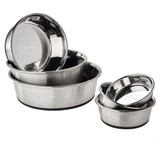The sector will be indirectly affected by the carbon tax due to carbon pricing on energy, freight and agricultural inputs.
Large food processors and manufacturers will be the most affected, primarily through electricity or natural gas usage, for example through the operation of large cold storage or heating facilities.
The country's largest food manufacturers, such as those participating in the dairy and snack food industries, will be most likely to incur the $23-per-tonne carbon tax if any single manufacturing establishment emits more than 25,000 tonnes of carbon per annum.
These businesses will be required to purchase and surrender to the Australian government a permit for every tonne of carbon emitted until the introduction of the Emissions Trading Scheme in 2015.
The impact on logistics and freight costs will be pertinent to food processors due to off-road fuel transport usage across the domestic aviation, shipping and rail channels. The carbon tax will not apply to household transport fuels, light-vehicle business transport and off-road fuel use for agriculture, forestry and fishing industries.
Given food processing's reliance on agricultural inputs and the rising incidence of vertically integrated agribusiness corporations, downstream manufacturers may potentially be affected by the increase in farm operating costs.
As part of the Clean Technology Food and Foundries Investment Program, domestic food manufacturers will be entitled to merit-based grants from a $200 million fund created to encourage competitiveness in a climate of rising costs and increasing import penetration.
The grant is expected to primarily support investment in energy-efficient capital equipment, processes and products, and will last until 2016-17. Food processors are in a unique position to benefit from the imposition of the carbon tax and the transition to a low-carbon economy.
This is due to the relatively small cost of electricity, fuel and freight within their overall cost structures. The focus on carbon emissions and green trading could also provide many food processors with opportunities in new markets, products and customers.
In October 2010, ALDI became Australia's first retailer to use the Carbon Trust carbon footprint to label its everyday olive oil range to assist consumers to make more informed decisions about the amount of carbon dioxide and other greenhouse gases used to produce products.
- Suppliers
- New to HospitalityHub? Book a Demo
- Advertise with us
- Login
- Email Marketing
- Buyers
- Get Quotes
- Articles & Ideas
- Login
- Subscribe to newsletter
- My Details
- Get Quotes
- Bakery & Dough Processing Equipment
- Bar Equipment & Barware
- Bathroom Fixtures & Accessories
- Chocolate Making Machinery
- Cleaning & Housekeeping
- Commercial Coffee Equipment
- Commercial Cooktops
- Commercial Fridges & Freezers
- Commercial Kitchen Equipment
- Commercial Ovens
- Dish, Utensil & Glass Washing
- Entertainment & Outdoor
- Food Packaging & Ingredients
- Food Preparation Equipment
- Furniture & Fixtures
- Pizza & Pasta Making Equipment
- Point of Sale, AV & Technology
- Get Quotes
- Bakery & Dough Processing Equipment
- Bar Equipment & Barware
- Bathroom Fixtures & Accessories
- Chocolate Making Machinery
- Cleaning & Housekeeping
- Commercial Coffee Equipment
- Commercial Cooktops
- Commercial Fridges & Freezers
- Commercial Kitchen Equipment
- Commercial Ovens
- Dish, Utensil & Glass Washing
- Entertainment & Outdoor
- Food Packaging & Ingredients
- Food Preparation Equipment
- Furniture & Fixtures
- Pizza & Pasta Making Equipment
- Point of Sale, AV & Technology
Trusted by 200,000+ Australian hospitality buyers
Buyers
- Discover products & solutions
- Login
- Subscribe To Newsletter
- Browse All Products
- Read Articles
Suppliers
Advertise
- Promote your products & solutions
- New to HospitalityHub? Book a Demo
- Login / Forgot Password
- Advertise Your Products
- Success Stories
- Email Marketing
Trusted by 200,000+ Australian hospitality buyers












